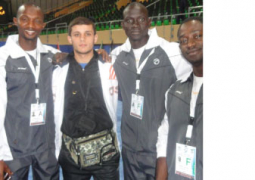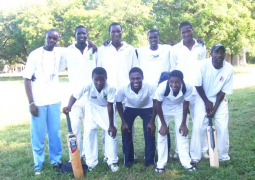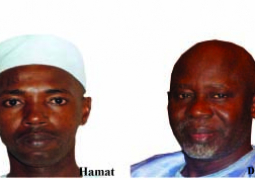In
December 2016 the People of The Gambia voted for a new President. The New
Administration promised a new transparency and the end of apparent corruption
and bad practices detrimental to the development of all the people. It called
on official and civil society stakeholders to work together and use every
available resource to move the country forward. This promise was hailed as a
New Beginning and international donors rushed forward with multimillion $
pledges to assist the country to achieve its development goals.
The
Paper Recycling Skills Project (PRSP) was established in 2001 (Reg. No.
556/2001) as a small community based organisation (CBO) with a focus on
environmental and educational activities at grassroots level. Mr. George Riegg,
a German National who moved to The Gambia in 2003, was appointed as General
Manager in 2006.
Since
2007, Caroczel, an artist from the USA and the creator of “Greenie” (resident
in The Gambia since 2012 and a PRSP board member) and Mr. Riegg designed and
developed child friendly environmental education materials and project
concepts. The first “Greenie” pilot project was implemented in 2010/11 in 65
nursery schools, in collaboration with local partners and the Ministry of Basic
and Secondary Education (MoBSE). Following the success of this pilot, the UNDP
GEF SGP provided US$ 40,000 for a second “Greenie” pilot. New, more advanced
teaching material was produced and the project was successfully implemented in
4 Lower Basic Schools.
In
2013, at the official launch at the end of this pilot project, our guest of
honour, the Focal Point for the Great Green Wall for the Sahel and Sahara
Initiative (GGWSSI), congratulated the team and expressed an interest to
develop a proposal for the GGWSSI, using our pilot as a template, for a
nationwide rollout.
Under
an existing MoU between MoBSE and PRSP, a project proposal was developed
between Mr. Gibril Barry (MoBSE SAU PEO, Environmental Focal Point for MoBSE)
and Mr Riegg (PRSP General Manager), targeting 60 schools over the 5 rural
regions and submitted in June 2014. The proposal went through the internal
Gambia Government approval process and at the end of 2014 it was sent to FAO
Rome as The Gambia’s GGWSSI proposed project component.
In
January 2015 a scoping mission from FAO Rome met with the proposal authors and
stakeholders and on 24.07.2015 the FAO local consultant, Mr. Kanimang Camara of
NACO, calls a meeting and informs the MoBSE/PRSP team that their proposal is to
be integrated into a larger, cross-cutting Action Against Desertification (AAD)
initiative.
A
project coordinator is appointed in April 2016, the project is officially
launched on 24.05.2016 and an FAO team from Rome visits The Gambia to finalise
budgets and work plans, identify fund recipients and start the process of
setting up Letters of Agreements (LoAs) with the main implementing partners
(DoF, MoBSE, NACO, ADWAC). It was agreed that PRSP would be acting as a service
provider to MoBSE under their LoA.
Between
April and September 2016 (6 months) Mr. Riegg attended numerous meetings
representing MoBSE and carried out numerous revisions of budgets and work
plans. He expresses to Mr. Barry PRSP’s concern that no contract or specific
agreement has been set up between MoBSE and PRSP, specifying responsibilities
and payments, but is told by Mr. Barry to “wait until all is approved” or “all
will be done under the existing MoU”. Mr. Barry finally informs Mr. Riegg in
October 2016 that any such written agreement is outside his authority or
responsibility and Mr. Riegg should address his concerns to his P.S.
On
9.10.2016 Mr. Riegg emailed the MoBSE P.S., Mr. Baboucarr Bouy, expressing his
concerns and requesting an urgent meeting, but is informed that he (the P.S.)
is travelling and “he really does not have time” to mediate – he requests that
the Acting Director of Basic Education, Madam Tida Jatta, arrange a meeting for
discussion. The meetings conclusion was that all issues will be resolved after
the LoA has been signed and that it was all a misunderstanding due to a lack of
communication.
Riegg
is informed by email on 29.12.2016 that the LoA has been signed by MoBSE. At
the beginning of 2017 Mr. Barry informs Mr. Riegg that he has been “mistakenly”
retired and he is therefore no longer in any position to discuss project issues
– all queries should be directed to Fatou Jassey, an officer in the SAU.
On
22.03.2017 Mr. Riegg meets the Director of the Curriculum Department (CREDD),
Dr. Burama Jammeh. Dr. Jammeh tells him that he never was made aware of the
involvement of Mr. Riegg, PRSP or “Greenie” when Mr. Barry briefed him about
the project in July 2016. He promises to look at the MoBSE/PRSP MoU and project
budgets to see if he can be of any assistance. Mr. Riegg emails the P.S. on
30.03.2017, again requesting an urgent meeting and is informed by the P.S. on
2.04.2017 that he is no longer in active service. On 5.04.2017, in a last
attempt, Mr. Riegg telephoned Dr. Jammeh, who informs him that he has had no
opportunity to address PRSP’s concerns over the last 2 weeks and he has no
information as to whom Mr. Riegg’s queries could be addressed to.
With
both Mr. Barry and P.S. Bouy no longer in active service with MoBSE, PRSP has
been cut off from meaningful dialogue and communication to acquire answers to
the question:
“How
can it happen that the Civil Society Organisation that has been instrumental in
conceiving, researching, designing and writing the project proposal as a form
of investment (NO proposal development fee was ever charged by PRSP) to
strengthen PRSP’s and MoBSE’s capacity and benefiting thousands of students and
community members, has been virtually written out of the implementation phase
of the project by its official development partner, the Ministry of Basic and
Secondary Education (MoBSE)?”
We
at PRSP are also wondering:
Is this behaviour acceptable to The
Gambia’s New Government, which is trying to promote cooperation between
official and civil society partners?
Is this a constructive way to use ALL
available resources in the country, when Ministries and/or their officers and
representatives disadvantage civil society partners, thereby threatening
livelihoods, just because they feel they can do so with impunity?
How can the New Administration
convince the international donor community that there is a new transparency if
situations like this are still happening openly in the public eye?
For
more info: George Riegg, PRSP General
Manager, Mob. +220 770 7090, email icecool@qanet.gm
Read Other Articles In Article (Archive)
Two senior prison officers charged, remanded
Feb 22, 2011, 12:57 PM




